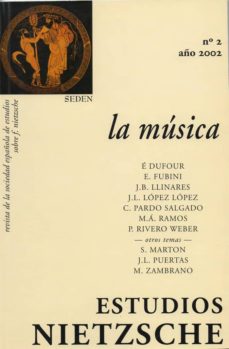Nietzsche: la obra hecha y la obra todavía por hacer
DOI:
https://doi.org/10.24310/EstudiosNIETen.vi2.8803Abstract
Este artículo expone como la filosofía, aunque se la considere en un sentido amplio, no se la puede confundir con un trabajo técnico, un área específica del saber o una ciencia. Es más bien una tarea, una misión, un destino. Y la tarea que Nietzsche reivindica para sí mismo, su misión y su destino, consiste en atribuir a la existencia humana un nuevo sentido, en hacer coincidir sentido y realidad.
Downloads
Metrics
References
Fink, E., La philosophie de Nietzsche, París: Minuit, 1965.
Heidegger, M., Nietzsche, Berlín: Gunther Neske,1961, vol. I.
Kofman, S., Explosions I, París: Galilée, 1992.
Leon Kossovitsch Signos e poderes em Nietzsche, São Paulo: Ática, 1979.
Löwith, K., «Nietzsche et sa tentative de récupération du monde», en Nietzsche ? Cahiers de Royaumont, París: Minuit, 1967.
Nietzsche, F., Fragmentos Póstumos I-IV (FP). Director ed. Diego Sánchez Meca. Madrid: Tecnos, 2006-2010.
Nietzsche, F., Obras Completas, I-IV (OC ). Director ed. Diego Sánchez Meca. Madrid: Tecnos, 2011-2016.
Nietzsche, F., Obras Completas, I-IV (OC ). Director ed. Diego Sánchez Meca. Madrid: Tecnos, 2011-2016.
Ovidio: «Nitimur in vetitum semper cupimusque negata; sic interdictis imminet aeger aques». En Amores III, 4, 17 .
Downloads
Published
How to Cite
Issue
Section
License
As of issue 21 (2021) this journal is published only in open access (diamond route).
From that number 21, like the previous numbers published in NIETZSCHE STUDIES, they are subject to the Creative Commons Acknowledgment-NoComercia-ShareIgual 4.0 license, the full text of which can be consulted at <http://creativecommons.org/licenses/by-nc-sa/4.0 >
It is the responsibility of the authors to obtain the necessary permissions of the images that are subject to copyright.
This work is licensed under a Creative Commons Attribution-NonCommercial-ShareAlike 4.0 International License.
Copyright generates two different rights: moral rights and patrimonial rights that EJFB recognizes and respects. Moral rights are those relating to the recognition of the authorship. They are rights of a personal nature that are perpetual, inalienable, unseizable and imprescriptible as consequence of the indivisible union of the author and his/her work.
Patrimonial rights are those that can be derived from the reproduction, distribution, adaptation or communication of the work, among others.







11.png)
